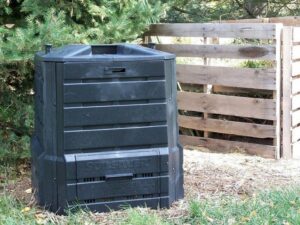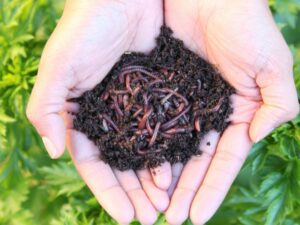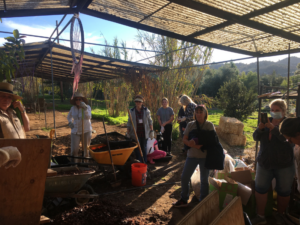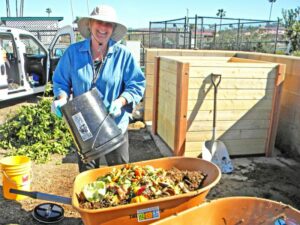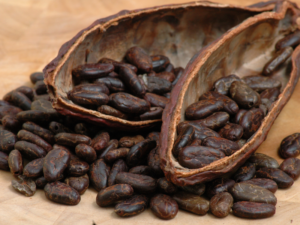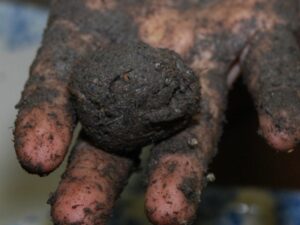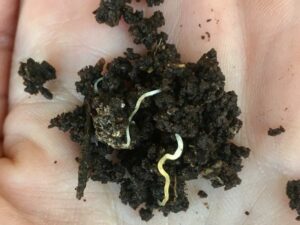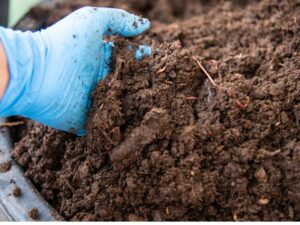Soil & Compost
Easy Ways to Rat and Critter-Proof Your Compost Bin
A common misconception and one we are often asked about is whether composting will attract rats. Rats are quite prevalent in San Diego, particularly roof (or tree) rats. Palm tree and other dense vegetation (bougainvillea, honeysuckle) provide ideal habitats. Food is often supplied from fruit trees, vegetable gardens, and bird feeders. It is important to note…
Read MoreSquiggling into Summer with Worm Composting
Our temperate San Diego weather is usually perfect for accommodating the red wrigglers used for vermicomposting. Their preference is for temperature ranges of 55 – 77° F, but they can tolerate temperatures above and below this range. Temperatures should be measured inside the bin since they can vary significantly from external measurements. As we approach…
Read MoreComposting Provides Benefits and Solutions for Local Growers
San Diego County is home to more small farms (less than 10 acres) than any other county in the U.S. and an ever growing number of community gardens, both of which often produce much more organic material than typical residences. Composting offers solutions for managing large amounts of organic matter and recycles the minerals and…
Read MoreTroubleshooting Your Backyard Compost Bin – Common Questions
Compost is a very forgiving process. There are many “roads to Rome,” and no two compost piles are alike. But sometimes things don’t seem to be going exactly how you want them to. Here are some common compost concerns and how to handle them. Every composter begins with their own unique blend of compostable materials…
Read MoreFrom the Rotline: How do I prevent swarms of flies in my bin?
While there is nothing wrong with having flies in a bin (and in fact, I implore you to find a bin without a resident fly population) they are often cited as a nuisance by backyard composters. Flies do enrich the bin ecosystem; having a variety of decomposers allows for material to be broken down more…
Read MoreRed Wiggler Worm Reproduction
As composters, we definitely love our worms. And if you have a healthy vermicompost bin, then you definitely know there’s lots of love between the worms, too. But how exactly do our worm bins become so populous? Red wiggler worms are frequent reproducers. If conditions in the bin are ideal, each worm can produce up…
Read MoreCocoa Oh No
I’ve been at the Solana Center for some time now, and the staff here really seem to love coconut coir! They are always recommending it as an ingredient in potting and seed starting mixes and as bedding for vermicompost bins. Coconut coir is a highly useful and sustainable product, but sometimes humans ask a scary…
Read MoreFrom the Rotline: Are Super Dense Worm Castings Still Usable?
Yes! Thick, fudgy castings are as viable a soil amendment as finer, more granular castings. Denser castings may, however, necessitate some adaptations to traditional methods of harvest and application. First, an important distinction: – Castings/Vermicast = Worm manure – Vermicompost = A mixture of worm castings and decomposed or partially decomposed organic matter that has not been digested by the worm. Worm castings are…
Read MoreCritters in Your Compost! (ID Guide)
Compost is ALIVE! Curious about what’s living in your compost? The physical and chemical conditions in a compost heap seem logical if you think about what compost really is–a big pile of food for billions of minute organisms. These microorganisms have certain chemical requirements, primarily: carbon for energy, nitrogen to build proteins, and oxygen for…
Read MoreToo many slugs in my compost bin!
Do you have too many slugs in your compost bin? In a spray bottle, mix in 1 cup ammonia to one quart water. Go out at night and spray slugs wherever you find them. Ammonia will have no affect whatsoever on your compost. It will only kill slugs and snails. If you go slug hunting…
Read More
